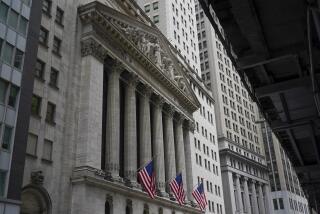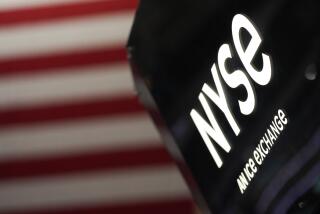Big Deals May Signal Recovery in Mergers
- Share via
The biggest day of merger deals in nearly four years could be a landmark for investment bankers, but previous perceived harbingers that failed to turn around the flagging industry tempered Wall Street’s enthusiasm Monday.
“I do think there are certain indications that things are turning up, but I don’t want to make too much of it because it’s still too early to say we’re back to the good old days,” said Mark Shafir, global head of mergers and acquisitions for Lehman Bros. Inc.
Four deals of $3 billion or more each were announced Monday for a total of more than $70 billion, making it the highest volume since deals worth more than $100 billion were announced Jan. 17, 2000, according to research firm Dealogic.
Bank of America Corp. agreed to buy FleetBoston Financial Corp. for more than $43 billion; Anthem Inc. is buying WellPoint Health Networks Inc. for $14.3 billion; China Telecom Corp. plans to acquire six regional networks from its parent company for $9.7 billion; and UnitedHealth Group Inc. is paying $3 billion for Mid Atlantic Medical Services Inc.
Some of the deal valuations, which included shares as currency, changed from their original announced prices as the stocks fluctuated.
After U.S. stock markets closed, R.J. Reynolds Tobacco Holdings Inc. and British American Tobacco announced that they would combine their assets and operations, but Dealogic did not include the deal in its calculations.
All those billions may persuade other chief executives to open their wallets too. But many thought the same thing a year ago when Pfizer Inc. unveiled its $61-billion proposed acquisition of Pharmacia, and then again in July when several big deals were announced over two days.
Neither helped spur mergers and acquisitions more broadly, however, and the languishing business of financial advice has continued its three years of sputtering that has cost thousands of bankers their jobs.
“Look, a few years ago this was a normal Monday, so you have to be cautious about calling it a resurgence of mergers,” said Linda Varoli, a senior analyst at Merger Insight, which provides research on large deals for institutional investors.
Many observers still expect the rest of the year to remain relatively slow because deal discussions waned at the beginning of the year amid the sluggish economy and the war in Iraq. A mergers and acquisitions recovery is expected next year, though.
“Our project backlog is higher than it has been in a couple of years,” Shafir said, “but you have to overlay that against the changes for corporate governance, CEO risk aversion because of pay issues and the legacy of the accounting scandals.”
With Monday’s banner numbers, the announced value of mergers and acquisitions deals involving U.S. companies reached $395.1 billion for 2003, surpassing the $367 billion recorded at this time last year.
The day was especially good for Goldman Sachs & Co., which advised on the three U.S. deals, helping the world’s No. 1 merger advisor to widen its lead over No. 2 Merrill Lynch & Co., which didn’t advise on any of the deals.
Morgan Stanley, which advised on the two biggest transactions, jumped to third place from sixth on Dealogic’s list of global merger rankings. Lehman advised on both health-care deals and moved to ninth from 10th.
More to Read
Inside the business of entertainment
The Wide Shot brings you news, analysis and insights on everything from streaming wars to production — and what it all means for the future.
You may occasionally receive promotional content from the Los Angeles Times.










